- Home
- Leslie Meier
French Pastry Murder Page 2
French Pastry Murder Read online
Page 2
Lucy began to have a slight inkling of where Norah was going with this, and nudged Sue. “Could she possibly be talking about us?”
“No.” Sue shook her head. “Don’t be silly. The Hat and Mitten Fund is tiny. I bet she’s talking about the Hospital Auxiliary.”
“Twenty years ago these four moms, all with young children of their own, began collecting hats and mittens for less fortunate children,” continued Norah.
Lucy’s jaw dropped, and she noticed Pam and Rachel were equally stunned. Sue turned and grasped Lucy’s hand. “I was wrong,” she whispered.
“Dubbed the Hat and Mitten Fund, the four moms went from simply collecting donated hats and mittens to actively raising funds to make sure that every child in Tinker’s Cove is ready for school with warm winter clothing, a nourishing breakfast, and a backpack full of school supplies.” Norah paused, adding one of those impromptu asides that made everyone watching the show believe that she was right there in their living room, talking directly to them. “Over the years we’ve added this up. These four women have raised over five hundred thousand dollars. . . .”
Here the audience erupted into enthusiastic applause.
Norah nodded sagely. “I know. Five hundred thousand dollars. It’s a lot of money, and it’s all gone for the benefit of local kids. So now I ask you to welcome these women who make a difference. Sue Finch, Rachel Goodman, Pam Stillings, and Lucy Stone. Come on up, ladies.”
Lucy found herself unable to move, but Sidra was at her elbow, guiding her, and she joined the others, all equally dazed as they made their way up the steps to the stage. It was terribly bright under the stage lights, Lucy was blinking, and the applause was a roar in her ears. Then they were all sitting down on a long couch, and a screen dropped behind them and a video was shown. Lucy recognized Lexie Cunningham and her daughter Angie, and Lexie was saying how the Hat and Mitten Fund had helped her family when Angie was in the hospital, waiting for a kidney transplant. Then a smiling and healthy Angie was shown, sporting her backpack and climbing onto the school bus. The picture faded, the screen slid out of sight, and the audience was once again clapping enthusiastically.
Lucy wanted to get up and tell them to stop, tell them that they hadn’t done anything special, that they’d just seen a need and tried to fill it. She felt like a fraud, unworthy of all this attention. Wouldn’t anybody do the same thing?
“I’m sure these women would all say that they didn’t do anything extraordinary,” said Norah. “But the truth is that just by being good neighbors, by helping others in their town, they have made a real difference. They have made Tinker’s Cove a better place for children and families and . . .” Here she paused dramatically, appealing to the audience. “Don’t you think they deserve a reward?”
From the roar of approval that followed, it seemed that the audience did think they deserved a reward. What would it be?
“An all-expense-paid trip to Paris!” announced Norah as the lilting notes of “La Vie en Rose” began to play and the screen began showing footage of the Eiffel Tower, Notre-Dame, and tourist boats on the Seine.
“Imagine! April in Paris! All four ladies, and their husbands, will be going to Paris for two weeks, where they will stay in a luxury apartment in the very trendy Marais district, and . . . there’s more!”
The pictures on the screen changed, and it now showed a professional-style kitchen and a chef wearing a tall white toque. “While enjoying all the attractions of the world’s most beautiful city, they will also get a week’s worth of lessons at Le Cooking School from renowned pastry chef Larry Bruneau!”
Lucy glanced at Sue, thinking that her friend looked as if she’d died and gone to heaven. “I can’t believe it,” mouthed Sue, nudging the others.
Sidra must have been behind this, thought Lucy. Only Sidra would have known how much Sue, a gourmet cook, would enjoy lessons from a genuine chef. And Paris, that was another of Sue’s enthusiasms. Sidra had come up with the idea for her mother, and the rest of them were tagalongs. But that was okay with her. She didn’t care about cooking classes; she was more interested in gardens and museums. But she was finally going to get her dream of seeing Paris, and more importantly, she’d be able to spend time with her unhappy daughter. She was smiling, she realized, and she couldn’t seem to stop. Now she was actually jumping up and down, right along with her three friends. They were all holding hands and jumping up and down like sorority sisters who all had dates for Spring Fling. They were going to Paris!
Chapter Two
It was the light. There was something special about the light in Paris, thought Lucy as the minivan rocketed along the Seine River. Maybe it was the time of year, April, or maybe all the gray buildings and the stone embankments that bounded the Seine, but the sunlight wasn’t at all like the hearty, dazzling blast you got in Maine. It was thinner somehow, gentler and more liquid, as if it were coming through a filter.
“That’s Notre-Dame,” said Sue, poking her in the ribs and pointing out the window.
So it was. Lucy had seen the cathedral only in pictures, but there it sat, solid and massive, complete with those amazing flying buttresses, right on an island in the middle of the river. “I can’t believe I’m really here,” she said.
“Well, you are,” said Bill, who was seated behind her in the crowded van.
The van driver had been waiting for them when they got through immigration, holding a sign that read TINKER’S COVE EIGHT. A touch of humor from Norah, Lucy had thought, or, more likely, Sidra. The driver, Henri, had led them through the chaotic terminal at Charles de Gaulle Airport and through the automatic doors to the even more disorganized scene outside, where roadway repairs were forcing buses, cars, taxis, and vans to jostle for space at the curb.
“This would never happen in the U.S.,” Sue’s husband, Sid, had declared when a tiny Renault simply stopped in the middle of the single open lane to discharge a passenger, who took his own sweet time saying good-bye to the driver, heedless of the tie-up he was causing. Sid’s voice was full of disapproval. At home he designed and installed closet systems and liked everything to be in its proper place.
The four American couples had followed Henri, pulling their wheeled suitcases to a quiet parking area, where he’d helped them load their luggage into the van, arranging it like a puzzle. Then they had all squeezed inside, fitting their American-size bodies into the European-size van.
“I give you tour of Paree, no?” Henri had said, flooring the accelerator and zooming into traffic to be greeted with a chorus of beeps from the other drivers.
The first part of the drive had hardly been scenic. It was the sort of grimy autoroute that you’d find in the United States, leading into Boston or New York. But then they were in the city proper, and it looked exactly like Paris ought to look, with parks and shops and six-story buildings with tiled mansard roofs, French windows, and tiny balconies. Lucy could hardly take it all in.
“La Tour Eiffel,” announced Henri, pointing at the iconic structure. Then they crossed the river and were whizzing around the l’Arc de Triomphe, where a huge blue, white, and red French flag hanging from the center of the arch fluttered in the breeze, surrounded by a whirling ring of traffic. Horns blared as Henri took a right, cutting off several miniscule Smart cars, and headed right down the Champs-Élysées.
Then Lucy caught a glimpse of the famous glass pyramid in the courtyard of the Louvre, so quick she would have missed it if she’d blinked, and then they were battling traffic once again on the rue de Rivoli.
“Fantastic shopping here,” said Sue, adding in a reverential tone, “Bay Asch Vay. It’s the very French version of a hardware store.”
“Looks like BHV to me,” said Pam. “Whatever could that mean?”
“It means expensive,” said Sid with a sigh, resigned to Sue’s passion for shopping.
Then they were caught in another whirling roundabout, this time around the tall verdigris column that now stood in place of the Bastille prison, wh
ich was destroyed by an angry mob in 1789, sparking the French Revolution.
“They make such a big deal about it, but there was only a handful of prisoners inside,” said Ted Stillings, Pam’s husband. As editor and publisher of the Pennysaver, he had a journalist’s commitment to the facts.
“It was symbolic,” said Bill, yawning. Lucy knew her husband needed his eight hours every night, and he hadn’t been able to sleep on the overnight flight. Neither had she, for that matter.
“I always feel so badly for poor Marie Antoinette,” said Rachel, who could probably find something nice to say about Idi Amin. “She seems so sweet.”
“I think you’re thinking of Kirsten Dunst in the movie,” said Sue.
“She was married to a fool. Louis XVI was a terrible king,” said Ted.
“The whole system was rotten,” said Rachel’s husband, Bob Goodman, who was a lawyer. “The king could get rid of anybody he didn’t like. He would simply issue a lettre de cachet with some poor devil’s name on it, and off he went to prison until the king decided to let him out.”
“It’s still rotten,” said Henri, surprising them all with his command of English. He took an abrupt turn down a quiet, very narrow street and braked in front of a pair of double doors, like old-fashioned garage doors, that were covered with unsightly graffiti. “Voilà. Neuf rue Roger Verlomme.”
They all scrambled out onto the sidewalk and stood awkwardly, looking down the empty street, which was lined with blank walls punctuated here and there with similar doors, all tightly closed. A few windows boasted window boxes planted with ivy and spring flowers, but even they were heavily curtained and offered no clues to the rooms within. Charming streetlights, styled like lanterns, hung here and there from the buildings.
“What do we owe you? How much?” Ted asked Henri as he reached for his wallet.
“No problem. All paid,” said Henri, but seeing Ted replacing his wallet in his pocket, he added pointedly, “Did you enjoy the tour of Paris?”
Sid was on it. He had a couple of euro coins he was intending to give to Henri, but Sue stopped him. “Give him a twenty,” she hissed.
Sid gave her a look as if she were completely mad, and Bill stepped up, slipping Henri a twenty-euro bill. “All set?”
“Merci,” replied Henri. “Have a nice time in Paris.” He paused, indicating a small treed plaza at the end of the street, filled with chairs and tables. “That’s a nice café,” he added before jumping into the driver’s seat.
Then the van was gone, and the eight Americans, tired from the overnight flight, as well as the struggle at the baggage carousel and the long lines at immigration, were standing on the street, next to a pile of suitcases, apparently locked out of their promised luxury apartment.
“What now?” asked Rachel.
“Try the buzzer,” advised Sue, pointing out a keypad fixed to the wall beside the doors.
Rachel pushed the one button that didn’t have a letter or number, and moments later one of the big doors popped open and a slender woman of a certain age, her gray hair beautifully coiffed, and wearing a flattering blue scarf around her neck, welcomed them. “Bienvenue, ” she said. “I am your concierge, Madame Defarge. This way, please.”
Lucy, somewhat giddy from a lack of sleep, stifled a giggle. She remembered reading Dickens’s A Tale of Two Cities in high school, with its unforgettable portrait of a fictional Madame Defarge, who knitted as the guillotine did its gruesome work eliminating the nobility, as well as anyone who opposed the revolutionaries during the Terror.
This Madame Defarge held the door for them, waiting as they gathered up their bags and stepped into a spacious cobbled courtyard, where a tree was leafing out, pots of spring flowers were lined up along the walls, and a few bicycles stood in a metal rack. The courtyard was bounded by several separate buildings, each with a doorway marked by a letter. Their doorway was labeled A, and once inside they found themselves faced with a rather treacherous-looking spiral staircase.
“One flight up,” said Madame, pointing. “First floor.”
“Isn’t this the first floor?” asked Pam.
“No, no. This is the rez-de-chaussée,” said Madame. “First floor is one flight up.”
“Better not all go at once,” cautioned Bill, drawing on his experience as a carpenter. “I don’t think it will hold us.”
“Nonsense,” said Madame, leading the way. “This escalier has been here since the last century, maybe longer.”
“Probably longer,” sighed Sid, taking in the crooked tilt of the landing.
“The key is special, very dear,” said Madame, holding up an enormous piece of brass hardware.
“I’ll say,” agreed Sid admiringly.
“There’s only one?” demanded Sue. “For eight people?”
“There’s another inside.” Madame adopted the attitude of a teacher. “Now, you must pay attention. In Paris we are very careful to lock the door because of thieves. So you must not, not ever, carry the key and the address together, because then a pickpocket or thief could steal your things.”
Lucy and Rachel found their eyes meeting, somewhat in disbelief. In Tinker’s Cove nobody locked their doors, and residents often had to search for their forgotten keys when they wanted to leave for a long vacation. Some people even left their keys in their car when they ran into the Quik-Stop for a gallon of milk.
“And now I want to tell you about the entrance keypad,” continued Madame. “The code is one-five-two-three-A, and you must never divulge it to anyone, or you will put all your courtyard neighbors at risk.”
“One-five-two-three-A,” repeated Lucy.
“Not out loud,” hissed Madame, implying Lucy was revealing a state secret.
“Sorry,” said Lucy, repeating the code to herself like a mantra.
“Now we go in.”
As Madame busied herself with the key, which had to be turned several times, Lucy imagined what the apartment would be like. Over the years she’d collected a number of Country French magazines and catalogs, and she pictured a cozy interior filled with comfy chairs and sofas upholstered in toile de Jouy fabric or perhaps Provençal prints, copper pots hanging from beamed ceilings and plenty of those mustard-colored crocks.
“Entrez,” announced Madame, opening the door and revealing featureless gray walls, a huge expanse of parquet flooring, a pair of enormous white leather sofas, a Lucite block serving as a coffee table, and French windows covered with severe blinds. “Very luxurious, no?” she asked.
Lucy bit her lip, trying to hide her disappointment.
“Very modern,” enthused Sue. “Roche Bobois, n’est-ce pas?” she asked, naming a high-priced French furniture company with a store in Boston.
“Peut-être,” replied Madame with a shrug. “La cuisine, c’est ici,” she said, leading them around the corner of the L-shaped space to point out a sleek modern kitchen.
At least that was what Lucy thought it was. There was a huge white marble island streaked with gray, which held a tiny sink and a cooktop, but not even a spoon was in sight. One wall was lined with pale wood cabinets, but the joinery was so subtle that Lucy never would have guessed their function had Sid not picked a spot and pressed against it, popping open a door. “Very nice,” was his verdict.
“The bedrooms are this way, down the hall,” trilled Madame. They followed her through the dining area, which featured a Parsons table and white leather chairs, and down a long hall, where she opened a door, revealing a huge bed covered with a shaggy white fur spread and a sleek mirrored armoire. “The bath is beyond,” she said, pointing to a door that was hidden in the wall. “Who will take this room?”
“We will,” said Sue, shouldering her way past her friends.
“Bien.” Madame led them to the opposite room, similarly outfitted, which Rachel and Bob agreed would do fine for them.
Pam and Ted got the next room, which left only one door remaining in the hallway. It had a stained-glass window, and when Lucy opened it, she
found a rather dated, old-fashioned bathroom with a rolltop tub. “Where’s the bed?” she asked.
“The sofa,” replied Madame. “The sofa is also a bed.”
“This apartment is supposed to sleep eight,” said Bill. “That’s what we were told.”
“Bien sûr. Three chambres and one sofa bed in the salon.”
“We don’t have a bedroom?” asked Lucy.
“No, madame. You have the sofa and this bath.”
Bill peered into the bathroom. “The tile is cracked,” he said. “It needs renovating.”
“It is a charming period salle de bain,” insisted Madame.
“It’s fine,” said Lucy, who knew when she was beat. “I’ve seen worse.”
“In a gas station,” muttered Bill.
“Quoi?” asked Madame, eyebrows raised.
“Nothing,” said Lucy, turning to Bill. “I guess we’ll stash the suitcases here. What do you think?”
“I think I’d like a nap,” said Bill, yawning and heading back down the hall to the living room.
“I hope you’ll be very confortable,” said Madame. “The second key is in the kitchen drawer. And now I will leave you.”
Lucy took advantage of the bathroom, which had a certain boho charm and was actually more to her taste than the rest of the ultramodern apartment, and freshened up. Then she returned to the living room, where Bill had stretched out on one of the sofas. “You shouldn’t nap,” she said. “It’s better to tough it out and keep going.”
“Who says?” asked Bill, yawning.
“The travel experts.”
“She’s right,” said Sue, joining them. “How’s your room?”
“This is our room,” said Lucy.
“You’re kidding!” exclaimed Rachel, rubbing lotion into her hands as she joined them.
“What a bum deal,” added Pam, seating herself on the other sofa.
“What’s a bum deal?” inquired Bob.
“Lucy and Bill have to sleep on the couch,” said Pam.

 Christmas Card Murder
Christmas Card Murder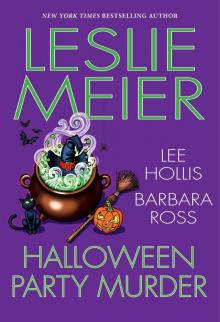 Halloween Party Murder
Halloween Party Murder 'Tis the Season Murder
'Tis the Season Murder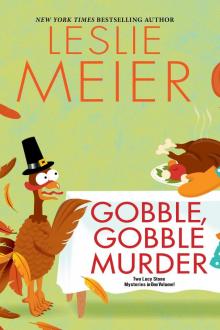 Gobble, Gobble Murder
Gobble, Gobble Murder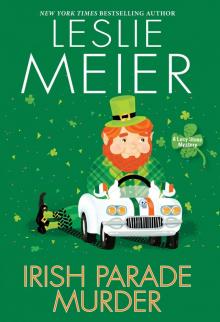 Irish Parade Murder
Irish Parade Murder Bake Sale Murder
Bake Sale Murder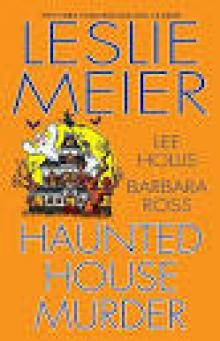 Haunted House Murder
Haunted House Murder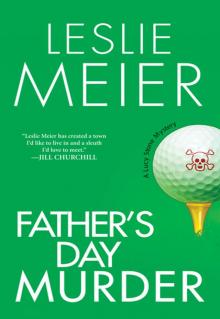 Father’s Day Murder
Father’s Day Murder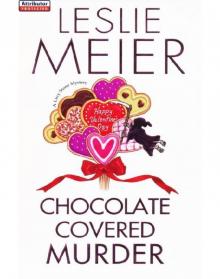 Chocolate Covered Murder
Chocolate Covered Murder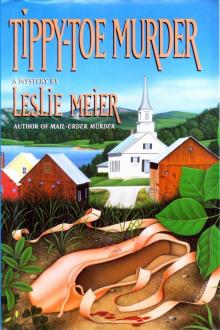 Tippy Toe Murder
Tippy Toe Murder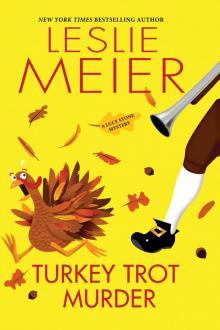 Turkey Trot Murder
Turkey Trot Murder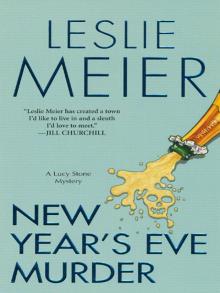 New Year's Eve Murder
New Year's Eve Murder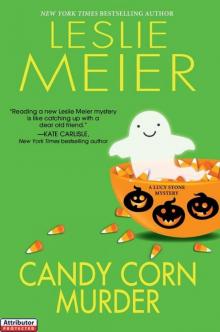 Candy Corn Murder
Candy Corn Murder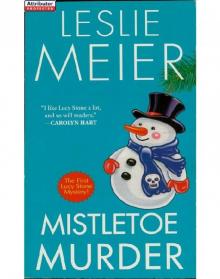 Mistletoe Murder
Mistletoe Murder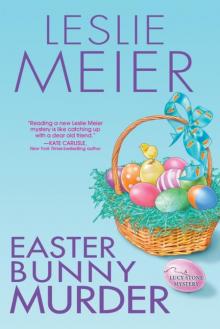 LStone 20 - Easter Bunny Murder
LStone 20 - Easter Bunny Murder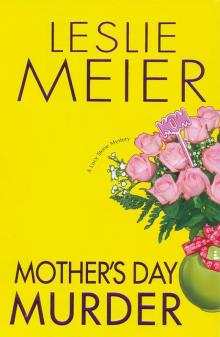 Mother's Day Murder
Mother's Day Murder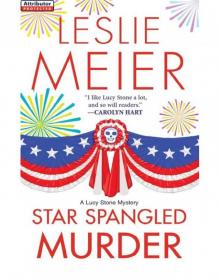 Star Spangled Murder
Star Spangled Murder Silver Anniversary Murder
Silver Anniversary Murder Wicked Witch Murder
Wicked Witch Murder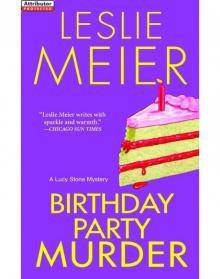 Birthday Party Murder
Birthday Party Murder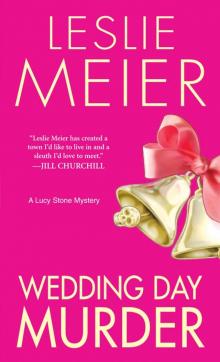 Wedding Day Murder
Wedding Day Murder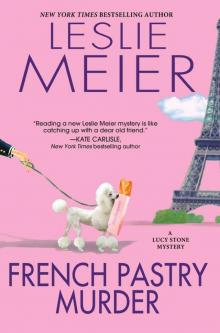 French Pastry Murder
French Pastry Murder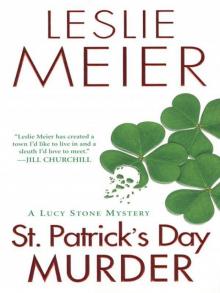 St. Patrick's Day Murder
St. Patrick's Day Murder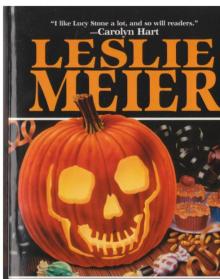 Trick or Treat Murder
Trick or Treat Murder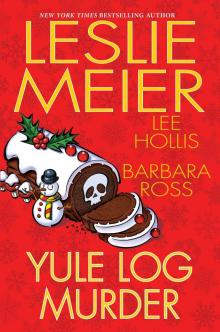 Yule Log Murder
Yule Log Murder Holiday Murder
Holiday Murder British Manor Murder
British Manor Murder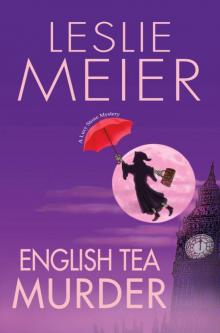 English Tea Murder
English Tea Murder